First published on Linkedin on February 1st, 2021.
In 2014, I took a data science course on Coursera due to my interest in the subject matter. Given other commitments at the time, I struggled to finish the course but somehow managed to get through it. I think I ended up with a 60% pass grade. You might be thinking — awesome right? Well, sure I got the certificate but if you ask me today what I learnt from that course, I will stare right back at you with no specific answer in mind. Why? I did not put any of what I learnt into practice.
Over the next years, I found myself repeating the same mistakes. I would find a course I am interested in online and jump right straight into it. The outcome were all similar — get the certificate of completion and move on to the next one. After a while, I realized that this was not the most effective use of my time since I was not really using what I had learnt so I decided to change something. And lucky enough, I came across Nishant Kasibhatla’s video where he talked about mastery and how to learn anything fast (see video at end of article).
In this video, Nishant Kasibhatla talked about four key steps you need to take to help cement whatever you have learnt including, learning, reflecting, implementing, and sharing (see my summary in image below).
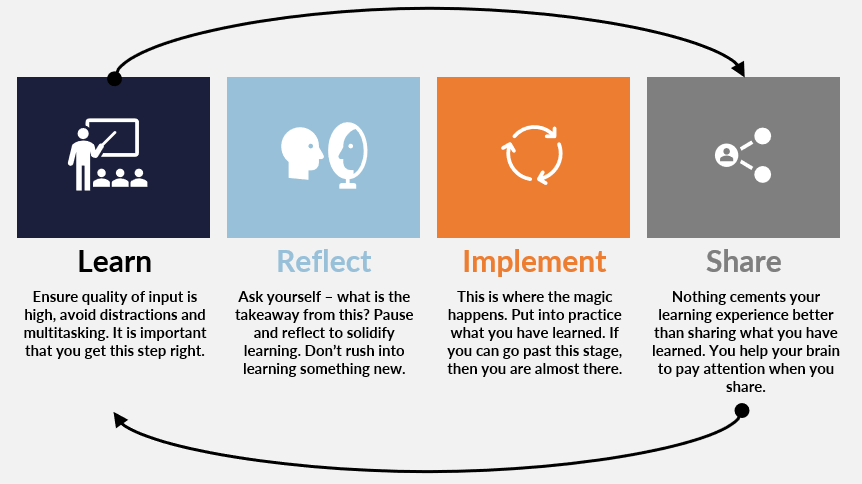
But before I go into the details of what the four steps entail, lets have a look at how the mastery process would look like in reality (image below). Note that it is this process that makes you good at what you do. Thus the slogan “use it or lose it” holds true.
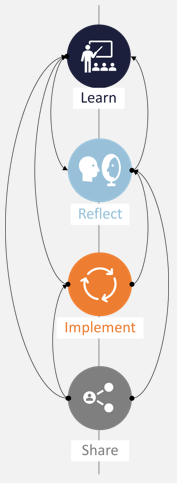
As you can see from the image above, it can really get messy. However, it is this to and fro process that makes it stick.
Learning
This is the backbone of it all. Therefore, you want to make sure the quality is good.
Avoid distractions, multitasking and make sure you are completely immerse in the game by dedicating time to fully concentrate.
Reflect
Ask yourself – so what is the takeaway from this? Have I fully understood the concept taught?
Pause and reflect to solidify learning.
Start thinking of ways you can implement this in your daily life.
Do not rush into learning something new without solidifying the previous. If you do this, then you are just doing yourself a disservice.
Today, there are tons of materials online for you to learn something new. Most of you are under some imaginary pressure to show that you are active in the learning media and you jump from one course to another.
Yes, you would get a badge of honour in form of a certificate but that is where it ends. In many cases, you would not be able to defend what ever you have learnt six months from now.
I know this because it happened to me.
There was a period where I took tons of courses online. One after another. My learning process stopped at step one – learning. I did not have time to reflect nor the opportunity to implement. I quickly jumped into the next one.
Of course, I have the certificates to show for it but please ask no further.
Implement
Folks, this is where the magic happens.
Nothing trumps implementation. This is where you put into practice what you have learnt. This is also where you feel stupid and realise that you do not know sh*t (sorry for my language here). It just explains the situation better.
I know this first hand and I am sure you do as well. You can share your experience with me in the comment section. Here is mine.
Prior to starting my first job, I took several courses on financial modelling. I had an interest and wanted to explore. Now for me, the highest step I had gotten to was step 2 – reflection. Even here I didn’t reflect much because I jumped into something else but I was somewhat confident I had what it took to build a functional model – remember illusion of competence?
Fast forward several months into my first job, a situation came where I was given two weeks to build a business plan and valuation model for a company we were consulting for at the time including all the interactions and fine tuning.
To be frank, I thought I had it under control until when I started. I spent the next evenings on Youtube and Google. The rest is history.
But what I can tell you is, after that experience, my confidence level for building a model increased several folds.
Share
One thing that is important to keep in mind here is that when you share, you help your brain to pay attention.
You are actually doing yourself a favour when you try to help a colleague on a problem or volunteer to help a group of people solve a problem.
How can you share?
There are tons of ways you can do this. Let us explore some. I would combine sharing with implementation here.
Let’s assume you just finished a course on Microsoft Power BI. You took your time to fully understand the course and have reflected well but you are struggling to implement all what you have learnt.
You read this article and know that you need to implement this to make it stick. There is however, a bottle neck. You do not have a job.
What can you do in this situation?
Find a business that you know are struggling with data visualization and ask them if they would be willing to take you in on a pro bono basis. If they agree, go in and do your best.
Remember, its pro bono. You went to them and they are not paying you. Expectation in such situations are usually low. But make sure you do your best to deliver top notch result.
There are two things you would gain in this.
First, experience with working with Power BI, work experience and a relevant contact.
Another example.
You want to be a become a good programmer. You have self-taught yourself all through but want to get better.
Here is one simple solution.
Find a primary or secondary school in your vicinity. Talk to the head or principal and tell them you would like to teach the kids / students how to code once a week.
This would force you to come up with a course plan. In the process of coming up with one, you would have to do some research, which you would not have done in normal circumstances. And you would also like the kids to do a project, which you have to design. You see the type of actions this sharing process is triggering?
By sharing, you force your mind to pay attention.
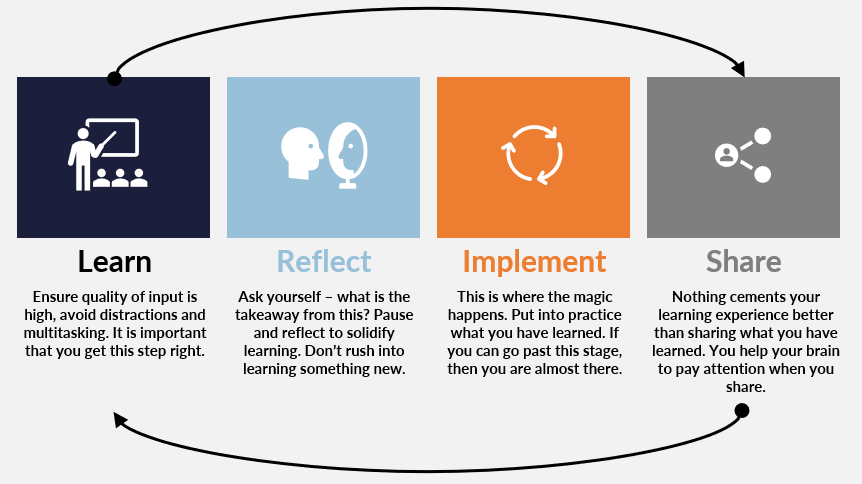
Before you pick up something new to learn, ask yourself — “how do I plan to use this”? Have a plan on how you want to implement what ever you have learnt so you do not fall prey of focusing more on the input rather than the output.
What are your thoughts? How have you been learning?
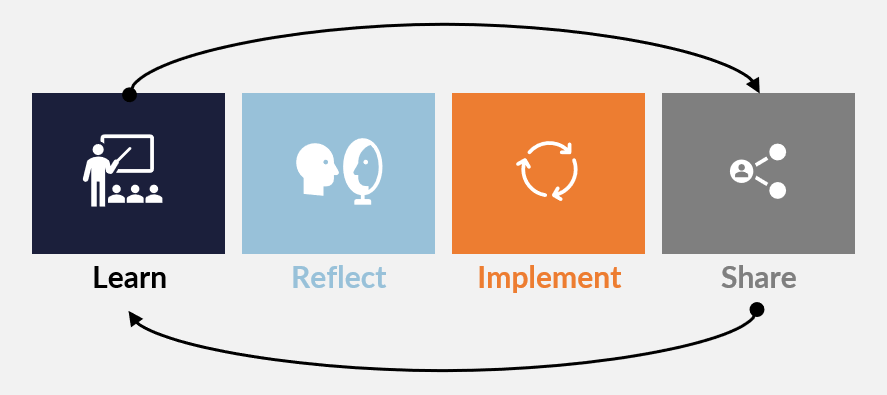

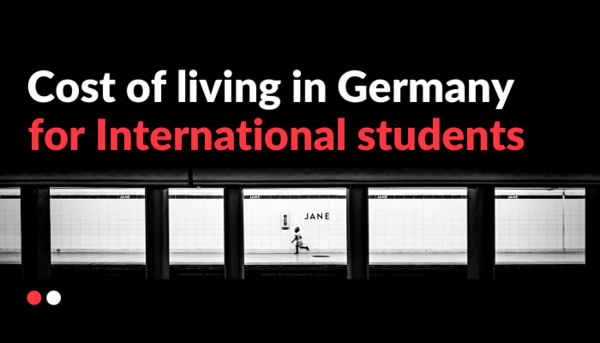
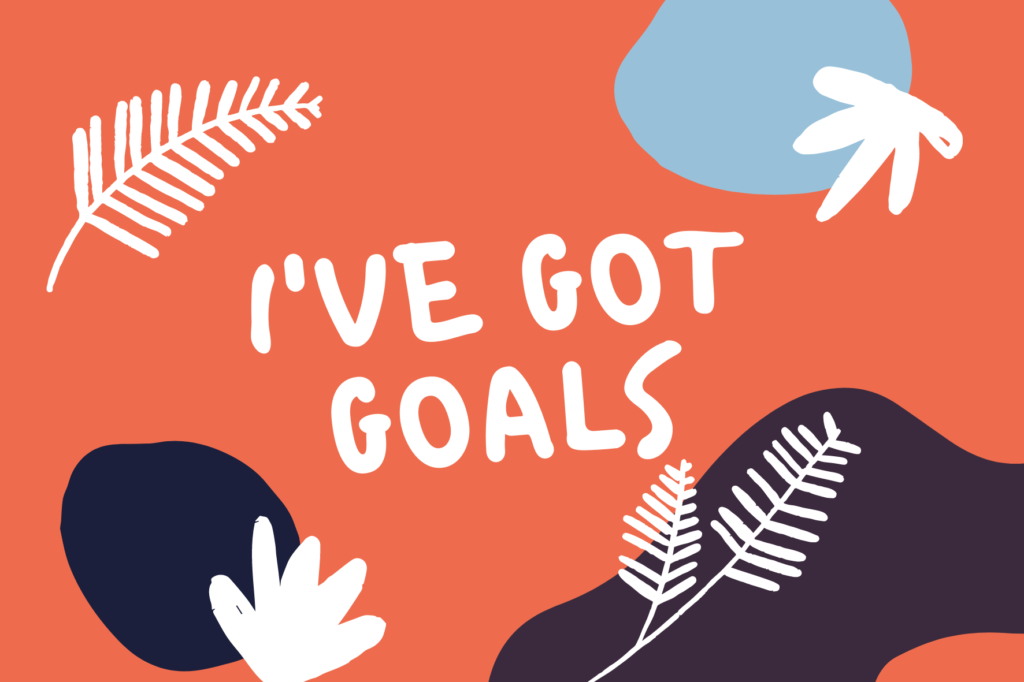
Leave a Reply
You must be logged in to post a comment.